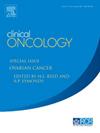Improving Clinical Decision-Making in Radiotherapy: A Comparative Analysis of Linear-Quadratic LQ and Linear-Quadratic-Linear LQL Dose Models
IF 3
3区 医学
Q2 ONCOLOGY
引用次数: 0
Abstract
Aims
Radiotherapy is an essential component of cancer treatment, requiring accurate dose planning to optimise tumour control while sparing healthy tissues. This study, originating from a radiobiology workshop held during the 27th Congrès National de Cancérologie et de Radiothérapie-2024 in Sousse, Tunisia, aims to investigate advanced dose modelling approaches, focussing on the linear-quadratic (LQ) and linear-quadratic-linear (LQL) models, to refine the calculation of biologically effective doses (BED) and improve treatment personalisation.
Methods
The workshop brought together experts in the field to discuss and evaluate the latest advancements in dose modelling, providing a comprehensive overview of current best practices and emerging trends. Using tools such as LQL-equiv and other BED calculators, we integrated patient-specific data (eg, fractionation schedules and organ-at-risk (OAR) constraints) to predict outcomes such as normal tissue complication probabilities (NTCPs). Unlike many theoretical studies, our approach embeds these models within a unified interface tailored to real clinical scenarios, enabling practitioners to simulate and adjust treatment plans based on complex, practical constraints.
Results
Through a series of clinical case studies (including treatment interruptions, palliative boosts, and re-irradiation scenarios), participant responses were analysed using the Jaccard similarity index, revealing a significant lack of consensus in treatment planning decisions (mean agreement of 25.83%). This variation illustrates the current ambiguity among clinicians regarding which model to use and how to apply it, despite access to advanced tools. This heterogeneity in decision-making could lead to divergent treatment recommendations for patients with clinically similar profiles.
Conclusion
While the LQ and LQL models offer promising tools for personalised radiotherapy, their interpretation and implementation remain highly variable. In addition, the question of professional responsibility in dose equivalence calculations emerged as a key issue as many departments lack clearly defined accountability frameworks. This study emphasises the need for standardised guidelines, enhanced training programs, and decision support systems to reduce interobserver variability and ensure effective clinical adoption, ultimately improving patient care. The findings underscore the importance of harmonising predictive modelling practices to achieve more consistent and effective radiotherapy outcomes.

改善临床放疗决策:线性二次LQ和线性二次线性LQL剂量模型的比较分析
目的放疗是癌症治疗的重要组成部分,需要精确的剂量计划以优化肿瘤控制,同时保留健康组织。这项研究起源于突尼斯苏塞举行的第27届全国癌症和放射学大会期间举行的放射生物学研讨会,旨在研究先进的剂量建模方法,重点是线性二次(LQ)和线性二次线性(LQL)模型,以改进生物有效剂量(BED)的计算并改善治疗个性化。方法研讨会汇集了该领域的专家,讨论和评估剂量模拟的最新进展,全面概述当前的最佳做法和新趋势。使用LQL-equiv和其他BED计算器等工具,我们整合了患者特定数据(例如,分块计划和器官风险(OAR)限制),以预测正常组织并发症概率(NTCPs)等结果。与许多理论研究不同,我们的方法将这些模型嵌入到一个针对真实临床场景定制的统一界面中,使从业者能够根据复杂的实际约束条件模拟和调整治疗计划。结果通过一系列临床病例研究(包括治疗中断、姑息性增强和再照射方案),使用Jaccard相似指数分析参与者的反应,揭示了在治疗计划决策方面明显缺乏共识(平均一致性为25.83%)。这种差异说明了目前临床医生对于使用哪种模型以及如何应用它的模糊性,尽管有先进的工具。这种决策的异质性可能导致对具有临床相似概况的患者的不同治疗建议。结论:虽然LQ和LQL模型为个体化放疗提供了很有前途的工具,但它们的解释和实施仍然存在很大的变数。此外,剂量等效计算中的专业责任问题成为一个关键问题,因为许多部门缺乏明确界定的问责框架。本研究强调需要标准化的指导方针,加强培训计划和决策支持系统,以减少观察者之间的差异,确保有效的临床采用,最终改善患者护理。研究结果强调了协调预测模型实践以获得更一致和有效的放射治疗结果的重要性。
本文章由计算机程序翻译,如有差异,请以英文原文为准。
求助全文
约1分钟内获得全文
求助全文
来源期刊

Clinical oncology
医学-肿瘤学
CiteScore
5.20
自引率
8.80%
发文量
332
审稿时长
40 days
期刊介绍:
Clinical Oncology is an International cancer journal covering all aspects of the clinical management of cancer patients, reflecting a multidisciplinary approach to therapy. Papers, editorials and reviews are published on all types of malignant disease embracing, pathology, diagnosis and treatment, including radiotherapy, chemotherapy, surgery, combined modality treatment and palliative care. Research and review papers covering epidemiology, radiobiology, radiation physics, tumour biology, and immunology are also published, together with letters to the editor, case reports and book reviews.
 求助内容:
求助内容: 应助结果提醒方式:
应助结果提醒方式:


